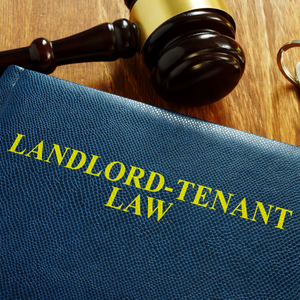
Understanding Tenant Responsibilities in Tennessee Rental Agreements
In Tennessee, understanding tenant responsibilities within rental agreements is crucial for maintaining a harmonious landlord-tenant relationship. Tenants are typically responsible for keeping the rental property in good condition and complying with specific terms outlined in the lease agreement.
This includes promptly reporting any damages or necessary repairs to the landlord to prevent further deterioration of the property. Regular cleaning and maintenance tasks, such as replacing light bulbs and smoke detector batteries, also fall under tenant obligations.
Additionally, tenants must adhere to noise regulations and ensure that their conduct does not disturb other residents. Any modifications to the property generally require prior approval from the landlord, ensuring that changes are reversible upon vacating the premises.
Adhering to these responsibilities helps tenants avoid disputes and potential deductions from their security deposit at the end of their lease term. Understanding these aspects of Tennessee rental agreements empowers tenants to fulfill their obligations effectively while enjoying a positive renting experience.
For landlords considering selling their rental property, properly maintained homes with tenants who follow lease obligations are more attractive to buyers and can achieve a higher market value. The Southern Sky Home Buyers team can help property owners assess tenant compliance, document property condition, and prepare the home for a smooth sale, ensuring both legal and financial aspects are properly managed in Tennessee’s real estate market.
Common Causes of Tenant Damage in Tennessee Properties
In Tennessee rental properties, tenant damage is a concern that landlords frequently face, often stemming from a variety of common causes. One major source of tenant damage is the neglect or misuse of the property, which can lead to issues such as broken appliances and damaged fixtures. Additionally, accidental damage occurs when tenants inadvertently cause harm to walls, floors, or furniture due to carelessness or lack of proper maintenance. Pet-related damage is also prevalent, as pets can scratch the flooring, chew on fixtures, and create stains on carpets. These same issues can become especially problematic when selling a house with pets, as visible pet damage or lingering odors may reduce buyer interest or affect property value if not properly addressed.
In Tennessee’s humid climate, moisture-related issues such as mold growth can arise if tenants fail to properly ventilate spaces or report leaks promptly. Furthermore, unauthorized alterations or DIY repairs by tenants can result in significant structural problems or code violations. These common causes underscore the importance of clear communication between landlords and tenants regarding maintenance responsibilities and the necessity of thorough lease agreements that outline expectations for property care in Tennessee rental situations.
Legal Obligations of Tenants Regarding Property Maintenance
Tennessee law places clear maintenance duties on renters, and knowing them helps avoid problems later. Renters must keep the leased space clean, safe, and secure, limiting any wear to what is considered normal in the industry.
Basic tasks such as disposing of trash and cleaning frequently used areas fall to the tenant. Using stoves, refrigerators, and other appliances as intended is necessary; any misuse that leads to breakage is the renter’s responsibility. Pouring grease in a sink, for example, can create bigger and costlier plumbing problems.
When a plumbing leak, broken window, or other issue arises that the renter cannot reasonably fix, the tenant must let the landlord or management know immediately. Reporting a broken refrigerant line quickly, for example, can prevent mold and refrigerant damage. Renters who wait too long can often be considered the source of the problem.
Ignoring any of these tasks can mean owing the cost of a repair that could have been done for a few dollars or might even lead to eviction. Reading the law and their lease helps tenants understand and manage these responsibilities.
Landlord Rights When Dealing with Tenant-caused Damage
In Tennessee, landlords have specific rights when addressing tenant-caused damage in rental properties. They are entitled to expect tenants to maintain the premises and return them in their original condition, excluding normal wear and tear.

If a tenant causes damage beyond reasonable wear, landlords can deduct repair costs from the security deposit after providing an itemized list of damages. Tennessee law requires landlords to notify tenants of these deductions within 30 days of lease termination.
Landlords may also pursue additional compensation through small claims court if the cost of repairs exceeds the security deposit amount. It is crucial for landlords to document all damages with photos or videos and keep detailed records of repair expenses.
This documentation not only supports their claims but also ensures compliance with Tennessee’s landlord-tenant laws. Understanding these rights helps landlords effectively manage their properties and minimize financial losses due to tenant negligence or misuse.
For landlords looking to sell their rental property, ensuring tenant compliance and properly documenting any damage can significantly increase a property’s marketability and sale value. If you’re ready to explore selling your rental property, you can contact Southern Sky Home Buyers to discuss strategies, assess your property’s condition, and streamline the selling process while protecting your investment.
Legal Recourse for Landlords: Small Claims Court Procedures
Landlords in Tennessee, confronted with damage to rental units caused by tenants, can turn to small claims court for an efficient solution. This venue is designed for monetary disputes of a limited amount, enabling quicker outcomes in a less formal setting that still honors the rule of law.
What makes small claims court accessible is that landlords may file claims without hiring an attorney, thereby saving on legal fees. To initiate the suit, landlords should compile documentary evidence: present-day photographs of the damage, copies of repair quotes, and invoices for completed work, so the court fully understands the financial impact.
Service of the summons on the tenant is the next step, and landlords must deliver this document in a manner that gives the tenant proper and timely notice of the hearing date. At court, both landlord and tenant briefly present their versions of events and the supporting evidence to the magistrate, who issues a ruling according to Tennessee’s landlord-tenant law and the parties’ written lease terms.
A successful suit may yield a monetary judgment that directs the tenant to pay repair costs or reimbursement. Through this low-cost, legally sound process, tenants facing serious damage claims directly go to a magistrate and can resolve disputes swiftly, knowing the court’s guidance is designed to preserve the integrity of their landlord-tenant leases.
How to Document and Report Tenant Damage Effectively
To document and report tenant damage in Tennessee actively and accurately, landlords should set up a systematic record of the rental property condition at two key points: move-in and move-out. Kick off the process with a detailed pre-occupancy inspection: snap labeled photographs of every room, every fixture, and every appliance, and jot down room-by-room descriptions of condition, clean or damaged.
It is also helpful to have the tenant complete a move-in condition checklist. That way both parties sign off on what already exists in the rental. When the tenant leaves and damage is identified, the landlord should act without delay. Capture crisp, well-lit photographs or videos of the damaged space, mark the time and date, and jot quick notes to explain what you see, whether a shattered window or a gaping hole in the drywall.
Beyond paperwork, a simple conversation can steer issues toward resolution. Remind your tenant, politely and clearly, of repair obligations specified in the lease. Put the recorded damage in writing: send a professional notice detailing what was damaged, the estimated cost of repair, and which lease paragraph governs obligations.
Conclude the process by keeping a single folder of email chains, inspection photos, repair receipts, and the tenant reports. This organized dossier can shield a landlord who faces a claim and needs to show they acted reasonably and by the book. By keeping the process neat, Tennessee landlords preserve their rights and the tenant’s rights, too, while the property is maintained on schedule and without open dispute.
Steps for Landlords to Recover Costs From Tenant Damages
In Tennessee, landlords seeking to recover costs from tenant damages must navigate a series of established procedures to ensure compliance with state laws. Initially, landlords should thoroughly document any damage to the rental property through photos and detailed written descriptions.
This documentation is crucial in substantiating claims against the tenant’s security deposit. Landlords must then provide tenants with an itemized list of damages and associated repair costs within 30 days of lease termination, as mandated by Tennessee law.
It’s important for landlords to communicate clearly and keep records of all correspondence with tenants regarding damage assessments and repair estimates. If the tenant disputes the charges or if the damages exceed the security deposit, landlords may need to consider small claims court as a venue for recovering additional costs.
In such cases, maintaining comprehensive records and evidence will be vital in presenting a compelling case before a judge. By following these steps diligently, landlords can effectively manage their rights and responsibilities concerning tenant damages while abiding by Tennessee regulations.
For landlords who prefer to avoid lengthy disputes or costly repairs, working with investor home buyers in Tennessee and neighboring cities can provide a fast and hassle-free solution. These companies purchase properties in any condition, allowing landlords to recover their investment quickly without navigating the complexities of tenant damage claims or small claims court. By selling to cash buyers, landlords can save time, reduce stress, and move on to their next opportunity easily.
Security Deposit Regulations and Use for Repairing Damages

Tennessee landlords and tenants should be clear on the rules about security deposits, especially when deciding who pays for property damage. The law views these deposits as a cushion for landlords against repairs stemming from a tenant’s stay.
First, landlords must keep deposits in a separate account and notify tenants in writing where the deposit is held. If damage exceeds normal wear, such as broken cabinets but not faded carpet, a landlord may deduct the repair charge from the deposit.
Landlords must then send the tenant a detailed, itemized statement of the repairs, including the deposit’s adjusted balance, within 30 days of the lease ending or the tenant moving out. To prevent conflicts, both landlords and tenants should carefully document the unit’s condition when the tenant moves in, using inspection checklists, dated photographs, and move-in inspection reports.
When both sides follow these simple steps, disputes typically can be avoided, and the security-requesting agreement can focus on the desirability of restoring the unit to move-in condition.
Understanding the Eviction Process Due to Property Damage
In Tennessee, understanding the eviction process due to property damage is crucial for both landlords and tenants. When a tenant causes significant damage to a rental property beyond normal wear and tear, the landlord may have grounds to initiate eviction proceedings.
According to Tennessee law, the landlord must first provide the tenant with a written notice detailing the specific damages and requesting repairs or compensation within a stipulated timeframe. If the tenant fails to comply, the landlord can file an unlawful detainer action in court.
During this process, it is essential for landlords to document all damages meticulously through photos and repair estimates, as these will serve as critical evidence in court. Tenants should be aware that intentional or negligent damage can lead not only to eviction but also to potential liability for repair costs.
To protect their rights, tenants are encouraged to communicate openly with landlords and address any issues promptly. Both parties should familiarize themselves with Tennessee’s Uniform Residential Landlord and Tenant Act, which outlines their rights and responsibilities in such situations.
Understanding these legal procedures helps ensure that both landlords and tenants navigate property damage disputes effectively while adhering to local regulations.
Essential Leases: Must-Have Terms on Tenant Property Care in Tennessee
In Tennessee lease agreements, landlords should insert rent clause language emphasizing tenant obligations for property maintenance. Leases need to spell out precisely what upkeep entails, distinguishing between customary wear and tenant-caused destruction.
Good agreements list everyday upkeep items tenants must perform, such as mowing the lawn or swapping out burnt-out bulbs. Larger hazards, like a burst pipe the tenant softened with neglect, deserve inclusion. Establishing each duty curbs later clashes, assuring renters recognize the part they play in unscathed upkeep.
They should also spell out the duty to tell the landlord or manager right away about broken goods. Early notice creates faster fixes, prevents tangled later damages, and keeps tabs on the roof, for example, from worsening and driving up future expenses. By outlining each allocation, the lease secures landlord value while cementing cordial lease relations.
Differences Between Normal Wear and Tear vs. Intentional Damage
In Tennessee leasing situations, knowing the line between average wear-and-tear and deliberate harm matters a lot for landlords and renters. Average wear-and-tear captures the beneficial life reduction that everyday living naturally causes: the nickel-sized paint chips from moving furniture, the beachy sun-dimmed dining room corners, or the traffic-worn carpet lanes in a kid- or pet-high corridor. These quirks are reasonable and, by law, usually not deducted from the security deposit.
Conversely, deliberate harm surpasses standard usage. It includes the broken window and does not promote careless kids, the Chicago decorator series-sized chunks the Pro Darts League left in a drywall, or that lone Vitamix smoothie the carpet now hosts. Because renters themselves or their guests caused this damage, leasing rules hold their security deposit for the repair or replacement bills.
Tennessee statutes balance that damage rate. Landlords must keep the leased space livable, including the roof, heating, and pest control, yet can keep security funds for repairable harm the resident caused. Keeping clean is not fair; renters still risk a bill they did not agree to if the landlord points to a hole or a dodged kitchen stain, and the landlord still must keep the kitchen, closet, and basement dry and secure.
The best hedge: rental checklists, moving photo angles, or movie scene packs in stop-and-go referencing safety nets, and well-spoken data. Signing in, then clicking out, keeps the upper hand upfront and is a remote minimalism risk to fight a careless or careless charge.
How State Laws Influence Handling of Tenant Property Damage
Tennessee state laws play a crucial role in defining how tenant property damage is managed within rental properties. Under Tennessee’s Uniform Residential Landlord and Tenant Act, landlords and tenants have specific responsibilities when it comes to property maintenance and repair.

This legislation outlines the obligations of tenants to keep the property clean and undamaged, while landlords are required to maintain structural aspects like plumbing, heating, and electrical systems. In cases where tenant-caused damage occurs, landlords can use the tenant’s security deposit to cover repair costs, provided they follow proper procedures for notification and documentation as stipulated by state law.
Importantly, any deductions from the security deposit must be itemized in writing to avoid disputes. Understanding these legal frameworks helps both landlords and tenants navigate their rights and responsibilities efficiently when dealing with property damage issues in Tennessee rental agreements.
For landlords who are considering selling a property affected by tenant damage, partnering with We Buy Houses in Knoxville, TN, and nearby cities can simplify the process. These cash home buyers can assess the property quickly, handle necessary repairs, and provide a fast, fair offer, helping landlords sell their home efficiently without the hassle of lengthy listings or traditional real estate complications.
What Happens If a Tenant Ruins Your Property?
When a Tennessee tenant accidentally or purposely inflicts major damage on a rental unit, it’s vital for landlords to grasp the relevant rights and obligations. Anything beyond the bounds of ordinary wear and tear can spark a tangled legal scenario.
Landlords should kick off the response by meticulously documenting the destruction with wide-angle photos, close-ups, and a running log of notes about each issue. In Tennessee, the law expressly permits landlords to dip into the tenant’s security deposit to defray the cost of fixing damage for which the tenant is accountable. The deposit itself may, however, simply get eaten up by the repair.
Should the cost exceed the deposit, pursuing the overscale charges may mean taking the tenant to small claims court. Here, collecting a money judgment is possible when the repair figures and the liability are clear. The wiser landlords take the time to craft leases that unambiguously specify the tenant’s duty to maintain the unit plus a catch-all clause. The clearer the lease, the firmer the foothold when the damage escalates to court.
When landlords follow the lease and Tennessee statutes, the likelihood of a quick, fair resolution climbs. The standard rental regulations mandate management of the unit’s habitability, and that duty gives Benson the requirement to provide warranties of habitability. Knowing the entire playbook, lease, security deposit, and the provision keeps the landlord’s investment above water and the tenant on manageable turf.
How Long Can a Landlord Wait to Charge for Damages?
In Tennessee, it’s key for both landlords and tenants to know how long a landlord can wait to dock charges for damages. The law grants a landlord a set amount of time to assess and bill for damages beyond ordinary wear and tear listed above their deposit.
The usual deadline is 30 days after the tenant leaves the apartment or the lease’s end. Within that window, the owner must send the tenant a detailed, itemized statement itemizing what is damaged and what it costs to repair. This gives the landlord time to walk the unit, take photos, line up quotes, and carefully decide what can be deducted.
If the landlord misses that 30-day mark, he can no longer take the claimed amounts from the deposit, and the tenant gets that money back in full. Even so, routine walk-throughs with checklists can keep both sides informed so no one is blindsided at the end.
Everyone is better off when both sides know both their rights and their deadlines. Keeping up with the law allows for quicker, less contentious resolutions at the end of a lease in Tennessee.
Dealing with tenant damage to your property in Tennessee? If you need to sell quickly, skip expensive repairs, or want a stress-free solution, Southern Sky Home Buyers can help. We provide fair cash offers, manage all the paperwork, and make selling straightforward. Have questions or ready to sell? Call us at (865) 249-0226 for a no-obligation offer and get started today!
Helpful Tennessee Blog Articles
- Tennessee Inheritance Laws For Real Estate And Housing
- Understanding Closing Costs in Tennessee
- Can You Back Out Of A Real Estate Contract In Tennessee?
- Maximize Your Sale: Selling A Tennessee Home As-is
- Tennessee House Vacancy Rules And Insurance Implications
- Guide To Selling Your Tennessee Home By Owner
- Tenant Damage Responsibilities In Tennessee Rental Properties
- Sell Your Tennessee Home Successfully With A Reverse Mortgage
- Tips for Selling and Buying a Home Simultaneously in Tennessee
- Tennessee Squatter’s Rights
- Can You Put a Lien on a House in Tennessee?
- How to Terminate a Real Estate Listing Agreement in Tennessee

| SUBLEASING | LEASES | RENTALS | NOTICE TO QUIT | EVICTIONS | EXPENDITURES |
| RENTERS’ RIGHTS | TENANT RIGHTS | NASHVILLE | FEES | ANIMAL | NONCOMPLIANCE |
| ATTORNEYS | LAWYER | UTILITIES | PRIVACY | PAYMENT | |
| RELIEF | REMEDIES | GRACE PERIOD | CONTRACT | GUARANTEES | CITATION |
| ATTORNEY’S FEES |
